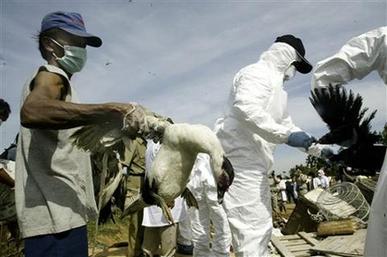
The US government has asked two scientific journals not to publish key details of a federally-funded experiment that created new, more infectious strains of a deadly bird flu virus. Government biosecurity advisers have raised concerns that some of this information could be used by terrorists. The scientific community is debating how to balance the free flow of research data with national security.
H5N1 is the name of a bird flu virus that's commonly found infecting poultry flocks in Southeast Asia, but one that has rarely infected humans. But when it has, the bird flu has proved to be a highly infectious and potent disease, that is fatal 60 percent of the time.
But in a unique biomedical experiment, scientists at the University of Wisconsin, Madison, and the Erasmus University Medical Center in the Netherlands, engineered a strain of H5N1 that spreads more easily between mammals than the original strain - which means that some variants can also be more contagious to humans.
It was this possibility that concerned the government's biosecurity advisers.
The US-based journal Science and the British journal Nature were asked by the government not to publish certain details of the experiment's methodology because that data could be used by terrorists to create a biological weapon.
The research was funded by the US government. Dr Anthony Fauci, Director of the National Institute of Allergy and Infectious Diseases says the research was funded because the virus is a legitimate public health concern.
But Dr Fauci believes the government also has a responsibility to oversee the results of such experiments.
"To have to strike a delicate balance between making information available for those who have a need to know for the good of public health, as well as not making it so freely available that anyone - even people without a legitimate need to know - can have access to it," Fauici said.
The editor in chief of the journal Science, Dr Bruce Alberts, says this is an important moment in the history of scientific publishing. He says this research and how Science and the British journal Nature decide to publish it will set a precedent for future publications.
It is likely, Dr Alberts says, that given the prevailing threat of terrorism, barriers to free access to scientific data will recur in the future.
"We will publish the version that is appropriate but missing some key information. We have been delaying publishing - we are working with our authors to make sure that at the time of publication we could also announce a mechanism - that will ensure scientists anywhere with a need to know - they will have appropriate opportunity to get the information that they might need," Alberts said.
The H5N1 study goes on to show that it is much easier to evolve this virus into a state where it can be transmitted through the air by coughing or sneezing, which could lead to a severe pandemic.
Dr Alberts says that is why the US government funded the research in the first place. Scientists want to understand the virus in its deadliest form so that they can start working on drugs and vaccines against H5N1, to prevent a worldwide pandemic.
But critics say the limits placed on the publication of the research raise legitimate concerns about who should have access to that knowledge. Paul Roepe, Co-Director of the Center for Infectious Diseases, says viruses always mutate. Sooner or later, he believes, virologists all over the world would be able to figure out the H5N1 mutation.
"Not as fast as these folk have done it, but that doesn't mean that people in other laboratories -- even laboratories in countries that ...are not terribly friendly...will not able to do this,"Roepe said.
The controversy over the new strains of the H5N1 virus -- which are being stored in secure labs in the US and Europe -- has also raised concern about the possibility that the new virus might escape, or be stolen, prompting calls for more secure research labs.
H5N1: 禽流感
pandemic: 流行病
Bird flu virus found in poultry markets
Keeping bird flu at bay a tough challenge
South Korea battles renewed spread of bird flu
Indonesian girl dies from bird flu, 3 undergo tests
(來源:VOA 編輯:Rosy)
